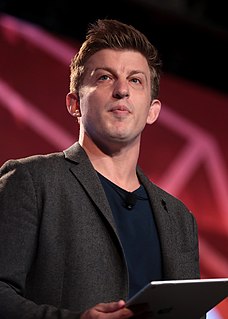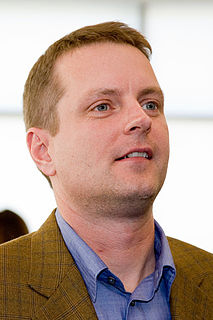A Quote by Alex Epstein
The natural environment is not particularly hospitable to human life ... the key to having a good environment is improving it through work... . Energy is fundamentally an environmental improver and if we classify it that way it makes sense out of a lot of these controversies... . It's our obligation and our right to make [our environment] as good for human beings as possible. With that view, it's very easy for people to understand precisely the reason it's good to alter it - because it doesn't naturally come the way we need it to be.
Quote Topics
Alter
Because
Beings
Classify
Come
Easy
Energy
Environment
Environmental
Fundamentally
Good
Having
Human
Human Being
Human Beings
Human Life
Improving
Key
Life
Lot
Make
Makes
Natural
Natural Environment
Naturally
Need
Obligation
Our
Our Environment
Out
Particularly
People
Possible
Precisely
Reason
Right
Sense
Through
Understand
Very
View
Way
Work
Related Quotes
I believe that to meet the challenge of our times, human beings will have to develop a greater sense of universal responsibility. We must all learn to work not just for our own self, family, or nation but for the benefit of all humankind. Universal responsibility is the key to human survival. It is the best foundation for world peace, the equitable use of natural resources, and through concern for future generations, the proper care of the environment.
Liberal gardeners are people who feel that, through gardening, we can alleviate our sense of alienation from nature; and that, through good gardening, we can repair some of the damage we have done to our environment. The most extreme liberals believe that there is an original or a natural state in which the environment would be if we hadn't shown up on the scene, and that we have not only the ability but also a moral imperative to help nature return to this state.
Local order in parts of the universe is always possible at the expense of heat and disorder dissipated to the external environment. The human body is one example: we take in energy from our environment to build up complex molecules that help power our bodies, and, in doing so, we release heat to the world around us.
As human beings, we all have reasons for our behavior. There may be people who have certain physiological issues that dictate why they make certain choices. On the whole, though, I think we're dictated by our structure, our past, our environment, our culture. So once you understand the patterns that shape a person, how can you not find sympathy?
You don't really need to engage your visual sense, because the natural wiring of the human psyche is to monitor the environment through sound, not through sight. But we're convinced through modern conditions that we have to look at everything, and that creates stress in our life, because we're trying to solve problems in ways that are much more time consuming, not efficient, and not fun.
We're all products of our environment, and I suspect that strength of will - the feeling, "I'm going to be able to do whatever you put in front of me" - is honed in an environment where not everything is easy. Ironically, growing up in that environment, you don't have a sense of aggrievement or entitlement. You just have a sense of overcoming.
A pleasant natural environment is a good - a luxury good, philosophical good, a moral goody-good, a good time for all. Whatever, we want it. If we want something, we should pay for it, with our labor or our cash. We shouldn't beg it, steal it, sit around wishing for it, or euchre the government into taking it by force.
In nature the only source of energy is from the sun. So in ecological systems everything comes from the sun through the process of photosynthesis whereas now in human built environment our source of energy is from fossil fuels, renewable, wood energy or hydro-energy but it is not from the sun. So until we are able to operate and run a human built environment by imitating photosynthesis it will be a long while before we can have a true eco-system.
If you look into the way that materials are used in an ecological system you'll notice that you'll find that there is no waste. The waste of one organism becomes food for another and everything's recycled in an ecological system whereas in our human built environment there's a throughput system. We use something then we throw it away... We have to imitate nature and try to re-use everything we make as human beings or recycle them - when we cannot re-use or recycle them we should try to reintegrate them back into the natural environment.
In the future it's very possible you could have an artificial intelligence system that can run the country better than a human being. Because human beings are naturally selfish. Human beings are naturally after their own interests. We are geared towards pursuing our own desires, but oftentimes, those desires have contrasts to the benefit of society, at large, or against the benefit of the greater good. Whereas, if you have a machine, you will be able to program that machine to, hopefully, benefit the greatest good, and really go after that.
Our environment, the world in which we live and work, is a mirror of our attitude and expectations. If we feel that our environment could stand some improvement, we can bring about that change for the better by improving our attitude. The world plays no favorites. It's impersonal. It doesn't care who succeeds and who fails. Nor does it care if we change. Our attitude toward life doesn't affect the world and the people in it nearly as much as it affects us.



































